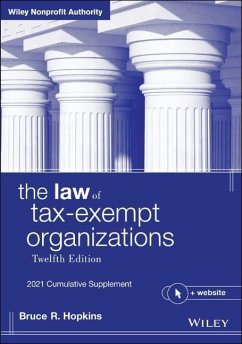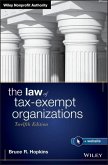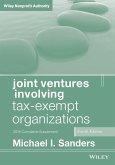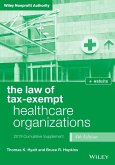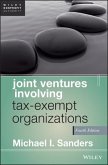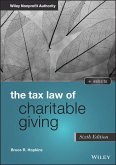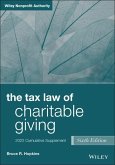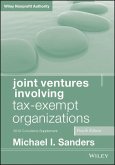- Broschiertes Buch
- Merkliste
- Auf die Merkliste
- Bewerten Bewerten
- Teilen
- Produkt teilen
- Produkterinnerung
- Produkterinnerung
Stay up to date on the latest developments in the law affecting tax-exempt organizations In The Law of Tax-Exempt Organizations: 2021 Cumulative Supplement, + Website, 12th Edition, readers will find guidance on the latest legislative and regulatory amendments and changes affecting tax-exempt organizations from 2021, as well as commentary on the most recent cases in the area. The book keeps nonprofit lawyers, accountants, and managers updated on the most critical new developments in the law, helping them remain compliant in a rapidly evolving and highly technical legal environment. You???ll…mehr
Andere Kunden interessierten sich auch für
![The Law of Tax-Exempt Organizations The Law of Tax-Exempt Organizations]() Bruce R. HopkinsThe Law of Tax-Exempt Organizations300,99 €
Bruce R. HopkinsThe Law of Tax-Exempt Organizations300,99 €![Joint Ventures Involving Tax-Exempt Organizations, 2018 Cumulative Supplement Joint Ventures Involving Tax-Exempt Organizations, 2018 Cumulative Supplement]() Michael I. SandersJoint Ventures Involving Tax-Exempt Organizations, 2018 Cumulative Supplement142,99 €
Michael I. SandersJoint Ventures Involving Tax-Exempt Organizations, 2018 Cumulative Supplement142,99 €![The Law of Tax-Exempt Healthcare Organizations, + Website The Law of Tax-Exempt Healthcare Organizations, + Website]() Thomas K. HyattThe Law of Tax-Exempt Healthcare Organizations, + Website222,99 €
Thomas K. HyattThe Law of Tax-Exempt Healthcare Organizations, + Website222,99 €![Joint Ventures Involving Tax-Exempt Organizations Joint Ventures Involving Tax-Exempt Organizations]() Michael I. SandersJoint Ventures Involving Tax-Exempt Organizations280,99 €
Michael I. SandersJoint Ventures Involving Tax-Exempt Organizations280,99 €![The Tax Law of Charitable Giving The Tax Law of Charitable Giving]() Bruce R. HopkinsThe Tax Law of Charitable Giving274,99 €
Bruce R. HopkinsThe Tax Law of Charitable Giving274,99 €![The Tax Law of Charitable Giving The Tax Law of Charitable Giving]() Bruce R. HopkinsThe Tax Law of Charitable Giving149,99 €
Bruce R. HopkinsThe Tax Law of Charitable Giving149,99 €![Joint Ventures Involving Tax-Exempt Organizations, 2019 Cumulative Supplement Joint Ventures Involving Tax-Exempt Organizations, 2019 Cumulative Supplement]() Michael I. SandersJoint Ventures Involving Tax-Exempt Organizations, 2019 Cumulative Supplement137,99 €
Michael I. SandersJoint Ventures Involving Tax-Exempt Organizations, 2019 Cumulative Supplement137,99 €-
-
-
Stay up to date on the latest developments in the law affecting tax-exempt organizations In The Law of Tax-Exempt Organizations: 2021 Cumulative Supplement, + Website, 12th Edition, readers will find guidance on the latest legislative and regulatory amendments and changes affecting tax-exempt organizations from 2021, as well as commentary on the most recent cases in the area. The book keeps nonprofit lawyers, accountants, and managers updated on the most critical new developments in the law, helping them remain compliant in a rapidly evolving and highly technical legal environment. You???ll also get access to the renowned authors??? companion website, offering several additional and valuable resources for advising professionals and non-profit managers and leaders alike.
Produktdetails
- Produktdetails
- Verlag: Wiley / Wiley & Sons
- Artikelnr. des Verlages: 1W119756280
- 12. Aufl.
- Seitenzahl: 352
- Erscheinungstermin: 30. März 2021
- Englisch
- Abmessung: 251mm x 178mm x 28mm
- Gewicht: 528g
- ISBN-13: 9781119756286
- ISBN-10: 1119756286
- Artikelnr.: 60073854
- Herstellerkennzeichnung
- Libri GmbH
- Europaallee 1
- 36244 Bad Hersfeld
- gpsr@libri.de
- Verlag: Wiley / Wiley & Sons
- Artikelnr. des Verlages: 1W119756280
- 12. Aufl.
- Seitenzahl: 352
- Erscheinungstermin: 30. März 2021
- Englisch
- Abmessung: 251mm x 178mm x 28mm
- Gewicht: 528g
- ISBN-13: 9781119756286
- ISBN-10: 1119756286
- Artikelnr.: 60073854
- Herstellerkennzeichnung
- Libri GmbH
- Europaallee 1
- 36244 Bad Hersfeld
- gpsr@libri.de
BRUCE R. HOPKINS is a practicing lawyer, law professor, and public speaker. He has written 40 books, and writes a monthly newsletter, on nonprofit law subjects. He maintains a website about tax-exempt organization law at www.brucerhopkinslaw.com.
About the Author xv
Preface xvii
About the Online Resources xix
Book Citations xxi
Part One: Introduction to the Law of Tax-Exempt Organizations
1 Definition of and Rationales for Tax-Exempt Organizations 3
1.1 Definition of Nonprofit Organization 3
(a) Nonprofit Organization Defined 3
2 Overview of Nonprofit Sector and Tax-Exempt Organizations 5
2.1 Profile of Nonprofit Sector 5
2.2 Organization of IRS 7
(a) IRS in General 7
(b) Tax Exempt and Government Entities Division 8
Part Two: Fundamentals of the Law Of Tax-Exempt Organizations
3 Tax Exemption: Source and Recognition 11
3.2 Recognition of Tax Exemption 11
(a) General Rules 11
3.3 Recognition of Public Charity, Private Foundation Status 11
4 Organizational, Operational, and Related Tests and Doctrines 13
4.1 Forms of Tax-Exempt Organizations 13
(a) General Rules 13
4.7 Commensurate Test 13
4.9 Commerciality Doctrine 13
(e) Other Applications of Doctrine 13
(f) Elements of Commerciality 14
(g) IRS Ruling Policy 14
5 Nonprofit Governance 17
5.3 Board Duties and Responsibilities 17
(a) Duty of Care 17
(b) Duty of Loyalty 18
(c) Duty of Obedience 18
5.7 IRS and Governance 18
(c) IRS Ruling Policy 18
Part Three: Tax-Exempt Charitable Organizations
6 Concept of Charitable 21
6.2 Public Policy Doctrine 21
(b) Race-Based Discrimination 21
6.3 Collateral Concepts 21
(a) Requirement of Charitable Class 21
(i) Illegal Activities 22
7 Charitable Organizations 23
7.2 Relief of Distressed 23
(b) Disaster Relief Programs 23
7.4 Provision of Housing 28
7.6 Promotion of Health 28
(a) Hospital Law in General 28
(b) Additional Statutory Requirements for Hospitals 28
7.8 Advancement of Education 28
7.14 Fundraising Organizations 29
(c) Other Exemption Issues 29
7.15 Instrumentalities of Government 29
7.17 Qualified Opportunity Zones 30
8 Educational Organizations 33
8.1 Federal Tax Law Definition of Educational 33
8.3 Educational Institutions 33
(a) Schools, Colleges, and Universities 33
8.4 Instruction of Individuals 34
8.5 Instruction of Public 34
9 Scientific Organizations 35
9.2 Concept of Research 35
10 Religious Organizations 37
10.1 Constitutional Law Framework 37
(a) General Constitutional Law Principles 37
(c) Internal Revenue Code Provisions 38
10.2 Federal Tax Law Definition of Religion 38
(c) Abuse of Tax Exemption 38
10.3 Churches and Similar Institutions 38
(c) Principle of Respect for Autonomy 38
10.5 Integrated Auxiliaries of Churches 38
10.7 Religious Orders 38
11 Other Types of Charitable Organizations 41
11.2 Amateur Sports Organizations 41
11.8 Donor-Advised Funds 41
(c) Portrait of Donor-Advised Fund Universe 41
11.9 Endowment Funds 43
(b) College and University Endowment Tax 43
12 Public Charities and Private Foundations 47
12.1 Federal Tax Law Definition of Private Foundation 47
(a) Private Foundation Defined 47
12.3 Categories of Public Charities 47
(b) Publicly Supported Chariti
Preface xvii
About the Online Resources xix
Book Citations xxi
Part One: Introduction to the Law of Tax-Exempt Organizations
1 Definition of and Rationales for Tax-Exempt Organizations 3
1.1 Definition of Nonprofit Organization 3
(a) Nonprofit Organization Defined 3
2 Overview of Nonprofit Sector and Tax-Exempt Organizations 5
2.1 Profile of Nonprofit Sector 5
2.2 Organization of IRS 7
(a) IRS in General 7
(b) Tax Exempt and Government Entities Division 8
Part Two: Fundamentals of the Law Of Tax-Exempt Organizations
3 Tax Exemption: Source and Recognition 11
3.2 Recognition of Tax Exemption 11
(a) General Rules 11
3.3 Recognition of Public Charity, Private Foundation Status 11
4 Organizational, Operational, and Related Tests and Doctrines 13
4.1 Forms of Tax-Exempt Organizations 13
(a) General Rules 13
4.7 Commensurate Test 13
4.9 Commerciality Doctrine 13
(e) Other Applications of Doctrine 13
(f) Elements of Commerciality 14
(g) IRS Ruling Policy 14
5 Nonprofit Governance 17
5.3 Board Duties and Responsibilities 17
(a) Duty of Care 17
(b) Duty of Loyalty 18
(c) Duty of Obedience 18
5.7 IRS and Governance 18
(c) IRS Ruling Policy 18
Part Three: Tax-Exempt Charitable Organizations
6 Concept of Charitable 21
6.2 Public Policy Doctrine 21
(b) Race-Based Discrimination 21
6.3 Collateral Concepts 21
(a) Requirement of Charitable Class 21
(i) Illegal Activities 22
7 Charitable Organizations 23
7.2 Relief of Distressed 23
(b) Disaster Relief Programs 23
7.4 Provision of Housing 28
7.6 Promotion of Health 28
(a) Hospital Law in General 28
(b) Additional Statutory Requirements for Hospitals 28
7.8 Advancement of Education 28
7.14 Fundraising Organizations 29
(c) Other Exemption Issues 29
7.15 Instrumentalities of Government 29
7.17 Qualified Opportunity Zones 30
8 Educational Organizations 33
8.1 Federal Tax Law Definition of Educational 33
8.3 Educational Institutions 33
(a) Schools, Colleges, and Universities 33
8.4 Instruction of Individuals 34
8.5 Instruction of Public 34
9 Scientific Organizations 35
9.2 Concept of Research 35
10 Religious Organizations 37
10.1 Constitutional Law Framework 37
(a) General Constitutional Law Principles 37
(c) Internal Revenue Code Provisions 38
10.2 Federal Tax Law Definition of Religion 38
(c) Abuse of Tax Exemption 38
10.3 Churches and Similar Institutions 38
(c) Principle of Respect for Autonomy 38
10.5 Integrated Auxiliaries of Churches 38
10.7 Religious Orders 38
11 Other Types of Charitable Organizations 41
11.2 Amateur Sports Organizations 41
11.8 Donor-Advised Funds 41
(c) Portrait of Donor-Advised Fund Universe 41
11.9 Endowment Funds 43
(b) College and University Endowment Tax 43
12 Public Charities and Private Foundations 47
12.1 Federal Tax Law Definition of Private Foundation 47
(a) Private Foundation Defined 47
12.3 Categories of Public Charities 47
(b) Publicly Supported Chariti
About the Author xv
Preface xvii
About the Online Resources xix
Book Citations xxi
Part One: Introduction to the Law of Tax-Exempt Organizations
1 Definition of and Rationales for Tax-Exempt Organizations 3
1.1 Definition of Nonprofit Organization 3
(a) Nonprofit Organization Defined 3
2 Overview of Nonprofit Sector and Tax-Exempt Organizations 5
2.1 Profile of Nonprofit Sector 5
2.2 Organization of IRS 7
(a) IRS in General 7
(b) Tax Exempt and Government Entities Division 8
Part Two: Fundamentals of the Law Of Tax-Exempt Organizations
3 Tax Exemption: Source and Recognition 11
3.2 Recognition of Tax Exemption 11
(a) General Rules 11
3.3 Recognition of Public Charity, Private Foundation Status 11
4 Organizational, Operational, and Related Tests and Doctrines 13
4.1 Forms of Tax-Exempt Organizations 13
(a) General Rules 13
4.7 Commensurate Test 13
4.9 Commerciality Doctrine 13
(e) Other Applications of Doctrine 13
(f) Elements of Commerciality 14
(g) IRS Ruling Policy 14
5 Nonprofit Governance 17
5.3 Board Duties and Responsibilities 17
(a) Duty of Care 17
(b) Duty of Loyalty 18
(c) Duty of Obedience 18
5.7 IRS and Governance 18
(c) IRS Ruling Policy 18
Part Three: Tax-Exempt Charitable Organizations
6 Concept of Charitable 21
6.2 Public Policy Doctrine 21
(b) Race-Based Discrimination 21
6.3 Collateral Concepts 21
(a) Requirement of Charitable Class 21
(i) Illegal Activities 22
7 Charitable Organizations 23
7.2 Relief of Distressed 23
(b) Disaster Relief Programs 23
7.4 Provision of Housing 28
7.6 Promotion of Health 28
(a) Hospital Law in General 28
(b) Additional Statutory Requirements for Hospitals 28
7.8 Advancement of Education 28
7.14 Fundraising Organizations 29
(c) Other Exemption Issues 29
7.15 Instrumentalities of Government 29
7.17 Qualified Opportunity Zones 30
8 Educational Organizations 33
8.1 Federal Tax Law Definition of Educational 33
8.3 Educational Institutions 33
(a) Schools, Colleges, and Universities 33
8.4 Instruction of Individuals 34
8.5 Instruction of Public 34
9 Scientific Organizations 35
9.2 Concept of Research 35
10 Religious Organizations 37
10.1 Constitutional Law Framework 37
(a) General Constitutional Law Principles 37
(c) Internal Revenue Code Provisions 38
10.2 Federal Tax Law Definition of Religion 38
(c) Abuse of Tax Exemption 38
10.3 Churches and Similar Institutions 38
(c) Principle of Respect for Autonomy 38
10.5 Integrated Auxiliaries of Churches 38
10.7 Religious Orders 38
11 Other Types of Charitable Organizations 41
11.2 Amateur Sports Organizations 41
11.8 Donor-Advised Funds 41
(c) Portrait of Donor-Advised Fund Universe 41
11.9 Endowment Funds 43
(b) College and University Endowment Tax 43
12 Public Charities and Private Foundations 47
12.1 Federal Tax Law Definition of Private Foundation 47
(a) Private Foundation Defined 47
12.3 Categories of Public Charities 47
(b) Publicly Supported Chariti
Preface xvii
About the Online Resources xix
Book Citations xxi
Part One: Introduction to the Law of Tax-Exempt Organizations
1 Definition of and Rationales for Tax-Exempt Organizations 3
1.1 Definition of Nonprofit Organization 3
(a) Nonprofit Organization Defined 3
2 Overview of Nonprofit Sector and Tax-Exempt Organizations 5
2.1 Profile of Nonprofit Sector 5
2.2 Organization of IRS 7
(a) IRS in General 7
(b) Tax Exempt and Government Entities Division 8
Part Two: Fundamentals of the Law Of Tax-Exempt Organizations
3 Tax Exemption: Source and Recognition 11
3.2 Recognition of Tax Exemption 11
(a) General Rules 11
3.3 Recognition of Public Charity, Private Foundation Status 11
4 Organizational, Operational, and Related Tests and Doctrines 13
4.1 Forms of Tax-Exempt Organizations 13
(a) General Rules 13
4.7 Commensurate Test 13
4.9 Commerciality Doctrine 13
(e) Other Applications of Doctrine 13
(f) Elements of Commerciality 14
(g) IRS Ruling Policy 14
5 Nonprofit Governance 17
5.3 Board Duties and Responsibilities 17
(a) Duty of Care 17
(b) Duty of Loyalty 18
(c) Duty of Obedience 18
5.7 IRS and Governance 18
(c) IRS Ruling Policy 18
Part Three: Tax-Exempt Charitable Organizations
6 Concept of Charitable 21
6.2 Public Policy Doctrine 21
(b) Race-Based Discrimination 21
6.3 Collateral Concepts 21
(a) Requirement of Charitable Class 21
(i) Illegal Activities 22
7 Charitable Organizations 23
7.2 Relief of Distressed 23
(b) Disaster Relief Programs 23
7.4 Provision of Housing 28
7.6 Promotion of Health 28
(a) Hospital Law in General 28
(b) Additional Statutory Requirements for Hospitals 28
7.8 Advancement of Education 28
7.14 Fundraising Organizations 29
(c) Other Exemption Issues 29
7.15 Instrumentalities of Government 29
7.17 Qualified Opportunity Zones 30
8 Educational Organizations 33
8.1 Federal Tax Law Definition of Educational 33
8.3 Educational Institutions 33
(a) Schools, Colleges, and Universities 33
8.4 Instruction of Individuals 34
8.5 Instruction of Public 34
9 Scientific Organizations 35
9.2 Concept of Research 35
10 Religious Organizations 37
10.1 Constitutional Law Framework 37
(a) General Constitutional Law Principles 37
(c) Internal Revenue Code Provisions 38
10.2 Federal Tax Law Definition of Religion 38
(c) Abuse of Tax Exemption 38
10.3 Churches and Similar Institutions 38
(c) Principle of Respect for Autonomy 38
10.5 Integrated Auxiliaries of Churches 38
10.7 Religious Orders 38
11 Other Types of Charitable Organizations 41
11.2 Amateur Sports Organizations 41
11.8 Donor-Advised Funds 41
(c) Portrait of Donor-Advised Fund Universe 41
11.9 Endowment Funds 43
(b) College and University Endowment Tax 43
12 Public Charities and Private Foundations 47
12.1 Federal Tax Law Definition of Private Foundation 47
(a) Private Foundation Defined 47
12.3 Categories of Public Charities 47
(b) Publicly Supported Chariti

